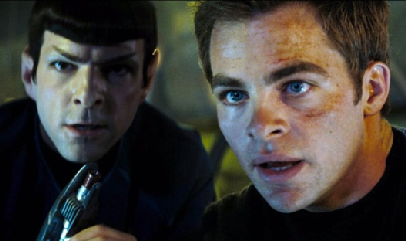I just got back from seeing the new Star Trek movie (or Star Trek XI, for those keeping track). I thought it was terrific – and so did the rest of the audience, who actually applauded at the end. The film did a good job of drawing in newcomers while also throwing in references to gratify the established fanbase (as well as a reference to one of Shatner’s Priceline commercials!). And I got the thrill I imagine I was supposed to get at seeing yellow-shirt Kirk finally showing up in the last scene.

Still, needless to say, I wouldn’t be a good trek’ar if I didn’t have a few gripes. SPOILERS FOLLOW:
- Nero’s motivation is not very well explained; why, exactly, does he blame Spock for what happened to Romulus? (Yes, I’ve read the prequel comic with Nero’s backstory, but a) you shouldn’t have to read the comic to understand the movie; b) frankly, even in the comic it’s not all that well explained; and c) in any case it’s not clear that the comic is even consistent with the film, given that in the film Old Spock certainly makes it sound as though he’d never met Nero before the latter went on his revenge rampage.)
For that matter, it’s not clear why, once Nero realised he was in the past, he didn’t just go to Romulus and give them the information about the threat so that they could avert it in time to save the planet. Just destroying a bunch of Federation worlds isn’t going to save Romulus in the future. Psst! Preventing a letting-die works a little differently from preventing a killing!
(On the other hand, there’s one supposed puzzle that I’ve seen raised on the internet that I don’t think is a genuine puzzle, namely, why Nero waits twenty years before taking revenge. I thought the answer to that question was fairly clear: both the target of his revenge (Spock) and the means of his revenge (red matter) are on Spock’s ship, so he has to wait for the ship to arrive.)
 While the casting was good and the character introductions were fun (and Greenwood as Captain Pike was fantastic; I wish we could see more of him), neither Kirk nor Spock had the gravitas of their predecessors. Now for this movie that’s fine, since they’re just starting out here; but it remains to be seen whether they’ll manage to pull off growing into those roles. (No actor has ever done any Vulcan as well as Nimoy did Spock on the original series.)
While the casting was good and the character introductions were fun (and Greenwood as Captain Pike was fantastic; I wish we could see more of him), neither Kirk nor Spock had the gravitas of their predecessors. Now for this movie that’s fine, since they’re just starting out here; but it remains to be seen whether they’ll manage to pull off growing into those roles. (No actor has ever done any Vulcan as well as Nimoy did Spock on the original series.) - The bullying of Kid Spock is handled more believably (i.e., less un-Vulcanly) than in the animated Trek episode “Yesteryear,” but it still seems un-Vulcan.
- The Spock/Uhura relationship doesn’t seem to result in any obvious way from Nero’s interference; yet it seems quite inconsistent with the characterisation of the original Spock.
- Old Spock’s telling Young Spock to forget logic and follow his heart was triggering for painful memories of Star Trek: Enterprise.
- Nothing about the Romulans seemed especially Romulan to me. Admittedly the Romulans have been portrayed in quite a variety of different ways over the years; but this version didn’t especially hook up with any of them.
The film’s greatest strength is also the basis for my biggest gripe. Rebooting the timeline is a clever idea – it gives them the freedom to do more stories with the original crew without being constrained by the canonical course of events. But the down side of this is that established characters and events have now been retconned out of existence – including such classic episodes as “Amok Time,” “Journey to Babel,” and “Balance of Terror” (the latter now invalidated because, thanks to Nero’s attack on the Kelvin, Romulan physiognomy, and thus the connection between Vulcans and Romulans, has become generally known). And that runs the risk of making those earlier stories, and the struggles and sacrifices they involved, seem a bit meaningless.
Still, the Trek franchise had gotten bogged down and needed some kind of rescuing, and Abrams has done it. I’m a great believer in Gordon Dickson’s advice: When in a situation that seems to have no solution, so that you find yourself going around and around in a circular search of ways already tried and found useless, then it is time to use dynamite – to throw out everything and start from scratch. The new Star Trek film definitely brings some much needed dynamite.

Still, there are some respects in which the new movie follows its predecessors all too closely. Consider:
- Star Trek movies that involve racing to ward off a threat to Earth: I, IV, XI.
- Star Trek movies that involve attempts to fix or alter the timeline: IV, VIII, XI.
- Star Trek movies that involve fighting against Klingons, Romulans, or both: III, V, VI, VII, X, XI.
- Star Trek movies that involve actually “seeking out new life and new civilisations”: at most, only the wretched V and the mediocre IX.
Here’s hoping the sequels that this movie will undoubtedly make possible will go back to exploring space – and ideas – again.
P.S. – Did anyone else notice that one of Kid Spock’s computer quizzes was about “non-rivalry and non-excludability”? Evidently they still believe in public goods problems in the 23rd century.
